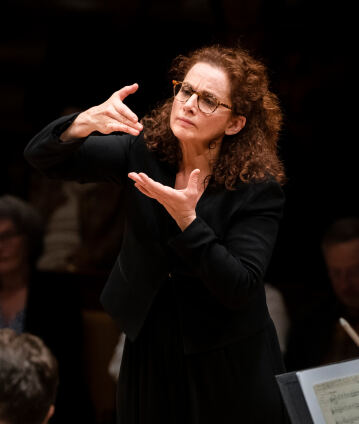Emmanuelle Haïm conducts Handel and Rameau

The Early music specialist Emmanuelle Haïm conducts works by Handel, including his famous Water Music, plus pieces by Jean-Philippe Rameau who is still too little known outside France. The two suites, compiled especially for this concert from the composer’s stage works, demonstrate not only Baroque gracefulness but also the originality of Rameau, who experimented masterfully with sounds and effects.
The conductor’s desk is one of the final male bastions in the Arts. All the more remarkable then, are the female artists who have found their way to this position. The Early music specialist Emmanuelle Haïm says of herself that she wanted to do the job when she was just a 12-year-old. However, for many years she performed as a cembalist in the Baroque music orchestras of William Christie and Christophe Rousset. Since then, she has progressed to leading her own ensemble, Le Concert d’Astrée, and through many energy-packed concerts, she has gained a reputation for herself as a “powerhouse interpreter”. (The New York Times)
For this concert with the Berliner Philharmoniker – the second since her debut in 2008 – Emmanuelle Haïm programmed some of the most beautiful and varied orchestral suites of the Baroque. The most famous of them is undoubtedly George Frideric Handel’s Water Music. Its spectacular first performance took place on 17 July 1717 during one of King George the First’s magnificent barge outings. He was so taken with the work, that he immediately had it performed three times in a row. As a matter of interest, the last time the Berliner Philharmoniker played this evergreen before this concert was more than 25 years previously in 1984, under the direction of Riccardo Muti.
Jean-Philippe Rameau stands alongside Handel as the focus of the evening, one of the most exciting composers of his time. Rameau’s speciality was dance suites which he integrated into his many operas, endowing them with a hitherto unknown richness of sound and sophistication. The spectrum of expression of this music particularly impresses, ranging from melancholy dreams to biting parody, from love songs to wild folk dances – a unique panorama of Baroque emotions.
© 2011 Berlin Phil Media GmbH
Related interviews
Artists
Our recommendations
- Emmanuelle Haïm conducts Handel’s “Music for the Royal Fireworks”
- Emmanuelle Haïm conducts an early Handel oratorio
- Emmanuelle Haïm conducts Handel’s “La resurrezione”
- Dance project: Season’s Whims
- A Russian evening with Gustavo Dudamel and Viktoria Mullova
- Simon Rattle conducts Brahms, Schoenberg, Berg and Webern